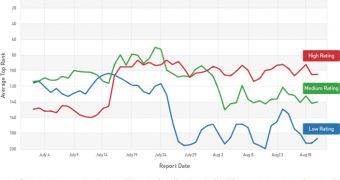With almost a billion apps available for its iOS platforms, Apple is instating new algorithms to properly rank these IPs, and therefore do justice for developers and end-users alike.
While Apple has generally ranked the top apps based on the sheer number of downloads (and how fast those downloads were achieved), the latest activity in the iOS App Store shows that the Cupertino giant has had a change of heart.
Likely because not all apps that get downloaded a lot offer a great user experience (for example, an app whose nomenclature is attractive, whereas the contents - upon downloading - is garbage).
To fix this, Apple has started ranking apps based on how users rate them. In other words, it’s the customer that propels an app to the top of the charts, not any potentially manipulated burst of downloads.
According to metrics firm Fiksu, “In late July, we first began to notice apps unexpectedly shifting position without a corresponding increase or decrease in downloads.”
“Upon closer inspection, we discovered these position changes correlated with the apps’ ratings. As evidenced by the graph […], apps with ratings of 4 or more stars received a rank boost in late July and have maintained that rank throughout August.”
Poorly rated apps (which garnered 3 star reviews, or lower), “received the opposite treatment about two weeks later, dropping off precipitously in rank and staying that way,” reports Fiksu.
As for average rated apps, these too suffered a tumble, but are the least affected, according to the firm.
Finally, Fiksu also notes that Apple is now updating the App Store charts once every three hours (as opposed once every 15 minutes).
The reason? “Three hours allows enough time to identify anomalies and remove apps before they suddenly appear at the top of the rankings,” Fiksu speculates.

 14 DAY TRIAL //
14 DAY TRIAL //